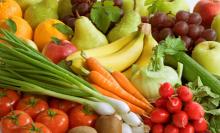
By Satya Kaur (RDP)
There are many reasons, at many levels, why we might resonate with this statement. However there is some new information that may help our yogic community with chronic inflammatory issues such as stiffness and pain, allergies, and auto immune issues connected with inflammation.
We know how to eat consciously. Our food choices are clean, lacto-vegetarian and Ayurvedic when we follow the teachings of Yogi Bhajan. Many of us avoid gluten for our health. While Yogi Bhajan specified dairy when we practice Kundalini Yoga, some of us may do best without it. Many of us choose organic as much as possible, we limit processed foods and sugar, and we regularly enjoy superfoods like kale, quinoa, fermented foods, berries and a wide variety of other fruits and vegetables.
And because we choose not to eat meat or fish or eggs, we depend on vegetable protein sources: nuts and seeds, soy and beans. These are foods that are widely praised for their health renewing qualities, they are full or anti-oxidants and phyto nutrients, and they are also foods that can be produced sustainably to feed everybody on our planet.
So it was somewhat of a shock to discover that when we eat high nutritional foods on a daily basis, we can inadvertently be creating inflammation by an overabundance of some of these very nutrients.
It seems that there are chemical constituents in many of these foods that that can accumulate and produce inflammation when we eat them too often. These chemicals, some of which are also important nutrients, include phenols, oxalates, salicylates, histamines, amines and glutamates. And those of us eating a vegetarian diet can be eating enough of them to produce inflammatory reactivity, even though they are individually and collectively often recommended in an anti-inflammatory diet.
I discovered this during a recent oceanic expedition voyage. The staff did a remarkably good job feeding a gluten free, dairy free vegan eater, but, knowing that I would not be near a store for 14 days, I brought along supplies of nuts and seeds and protein bars. The level of physical activity was high, with daily kayaking and hiking and biking, so I was also diving into the mixed nuts (high in peanuts) that were provided for evening snacks. I noted an increase in pain and inflammation in an old knee injury, which I attributed to the hours of exercise daily. After I got home, I was introduced to this new information by an online nutritionist, and when I looked at my food during that time, I saw that during the trip, I had inadvertently eaten a good deal of high oxalate foods. When I took a good look at my normal food choices, I noted that I eat a lot of almonds (almond milk, almonds and almond butter, almond cheese) as well as other healthy but high oxalate nuts, beans, vegetables and fruits. Once I made some changes (increased seeds, decreased nuts, varied the beans more, reduced chocolate and nonfermented soy and chose more low oxalate fruits and vegetables), the pain and swelling decreased dramatically in only a few days.
Since then I have started looking for these, along with the more obvious trigger foods like wheat, dairy and sugar, and have found significantly high oxalate burdens in many vegetarians. And I find other categories in non-vegetarians who eat the same foods very often, whether they are restricted for health or by habit.
If you have chronic inflammation, whether it is stiffness and pain or congestion or allergies or any inflammatory conditions (if it ends in ‘itis’ it means inflammation – arthritis, colitis, faschiatis, etc) or any auto-immune conditions such as thyroid imbalance, gastro-intestinal problems, diabetes, skin conditions or sensitivities, you might want to go online and check lists of foods high in these possible triggers (oxalates, phenols, salicylates, histamines, amines, glutamates). Over the counter medications can occasionally be sources also. And if you see that you tend to eat large amounts of any those foods, try reducing your intake substantially for a week and see what happens. One exception to this is turmeric, which happens to be high oxalate, but its many benefits far outweigh any possible downsides. Turmeric is one food to take forever!
Spices can be an issue. Although we usually use them in fairly small amounts, some people eat a surprising amount. I have a client who was addicted to heat in her food (hot spices are high in salicylates). When she stopped adding hot spices to every meal, her chronic congestion cleared up (and she started to taste her food again!)
I am happy to assist anyone who might be wondering about the degree to which inflammatory conditions may be connected with these substances. Just email me at [email protected] and tell me which of these you think might be relevant based on your online searches. I will ask your body and tell you. There is no charge for this. When I can help people to feel more ease, that is great.
Blessings for optimal health!








